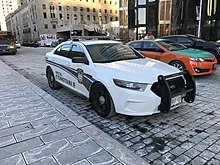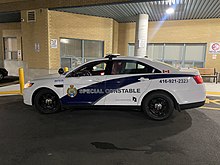Special constable
[1] Historically, and in different contexts, special constables have been paid or volunteer members of an ad-hoc reserve force or a permanent auxiliary, and have ranged from unarmed patrols to armed paramilitaries.Previously, to augment the NSW Police but also to protect the community against abuse or neglect by the NSW Police, Special Constables could be appointed by a magistrate or two justices where "tumult, riot, or serious indictable offence has taken place, or may be reasonably apprehended" and the magistrate or justices believe that "the ordinary constables or officers appointed for preserving the peace are not sufficient for the preservation of the peace, and for the protection of the inhabitants and the security of their property, or for the apprehension of offenders".Working alongside police officers, the Aboriginal Australian or Torres Strait Islander community constable help to run a wide range of programs.[7] Special constables can be employed by universities,[8] government corporations like transit commissions and bridge authorities,[9] police forces, municipalities, First Nations,[10] and humane societies.Special constables employed by the federal government are usually granted limited police powers for the purposes of civil law enforcement, such as investigators for the Competition Bureau and Transport Canada.[23][24] Special constables were also historically employed by the Royal Canadian Mounted Police as interpreters, guides, and aides in Indigenous communities in northern Canada.[10] Peace officers also compose the Alberta Sheriffs Branch, which is responsible for legislative and courtroom security, prisoner transport, highway safety, wildlife and conservation enforcement, and some criminal investigations.Their mission is to maintain peace, order and public security, to prevent and repress crime and, according to the jurisdiction specified in their deeds of appointment, to enforce the law and municipal by-laws, and to apprehend offenders.[38] Other police forces use special constables to investigate traffic collisions, collect evidence, or manage emergency or crime scenes.[19] Organizations which operate across the jurisdictions of several independent police services boards, such as GO Transit, usually receive special constabulary authorization directly from the provincial government.However, the passage of the Energy Act 2004 created a new police force – the Civil Nuclear Constabulary – with specifically defined powers and the officers lost their status as special constables.In Northern Ireland, the Royal Ulster Constabulary GC (RUC) employed both full-time and part-time reserve constables, the difference being that in addition to carrying out the same duties as the regular force, a number of full-time reserve officers were deployed to carry out static security duty at the homes of VIPs and at vulnerable buildings and police stations.With the transformation of the RUC into the Police Service of Northern Ireland (PSNI), 171 part-time constables were appointed in Banbridge, Newtownabbey, Coleraine and Lisburn District Command Units (DCUs).The NISGS is an unionised, non-industrial, civilian, armed, guard service under the authority of the general officer commanding (Northern Ireland), who holds ultimate responsibility for the operation of the organisation.A civilian security officer (CSO) is attested by a resident magistrate as a special constable whilst on duty within MoD property.




Transit Enforcement Unitspecial constabularyCanadaAustraliaAustralianNew South WalesNSW PolicemagistrateRoyal Society for the Prevention of Cruelty to AnimalsTransport for NSWNSW Healthrailway lawsIndependent Commission Against CorruptionGovernor of New South WalesSouth AustraliaSouth Australia PoliceIndigenous AustralianAboriginal AustralianTorres Strait Islanderhot pursuitBritish Columbia Provincial Police1935 waterfront strikeWinnipeg General StrikeAlbertaManitobaauxiliary constablesCompetition BureauTransport CanadaRoyal Canadian Mounted PoliceEdmonton Transit ServiceAlberta Sheriffs BranchCriminal CodeBritish Columbia Legislative AssemblyBritish ColumbiaCommercial Vehicle Safety and Enforcement ServiceConservation Officer ServiceSheriff ServiceIndependent Investigations OfficeQuebecToronto Community HousingToronto Police Services BoardOntarioBrantfordCobourgGO TransitUniversity of TorontoNiagara Parks Police ServiceNiagara Parks CommissionHong Kong Police ForceHong Kong Auxiliary Police ForceChief Executive of Hong KongGarda Síochána ReserveGarda SíochánaRepublic of IrelandSingaporeSingapore Police ForceSingapore Armed ForcesSingapore Civil Defence ForceHome Team Academypenal codeVolunteer Special ConstabularyUnited Kingdom Atomic Energy Authority ConstabularySpecial Constables Act 1923Energy Act 2004Civil Nuclear ConstabularyYeomen WardersTower of LondonHarbours, Docks, and Piers Clauses Act 1847Epping Forest KeepersEpping Forest Act 1878industrial violenceFirst World WarBritish police strikes in 1918 and 1919UK General Strike of 1926Special Constabulary Long Service MedalKing's Police MedalUlster Special ConstabularyNorthern IrelandRoyal Ulster ConstabularyPolice Service of Northern IrelandBanbridgeNewtownabbeyColeraineLisburnUlster Defence RegimentMinistry of DefenceNorthern Ireland Security Guard ServicePolice and Criminal Evidence (Northern Ireland) Order 1989Police (Scotland) Act 1967Police and Fire Reform (Scotland) Act 2012Scottish Police FederationChief Inspectortrade unionPolice ScotlandRoyal Irish ConstabularyIrish Republican ArmyIrelandBlack and TansAuxiliary DivisionCanadian Auxiliary ConstableAuxiliary policeLegion of FrontiersmenNational Service in SingaporeHonorary PoliceParish constablePolice Support VolunteerSecurity policeSpecial policeSpecial police forceHistory IrelandLaw enforcement agencies in CanadaCanada Border Services AgencyCanadian Forces Military PoliceCanadian Forces National Investigation ServiceCanada Revenue AgencyCorrectional Service of CanadaOntario Provincial PoliceRoyal Newfoundland ConstabularySûreté du QuébecAlberta Law Enforcement Response TeamsBritish Columbia Sheriff ServiceBritish Columbia Commercial Vehicle Safety and EnforcementBritish Columbia Conservation Officer ServiceCombined Forces Special Enforcement Unit – British ColumbiaOrganized Crime Agency of British ColumbiaHigh Sheriff of Newfoundland and Labrador